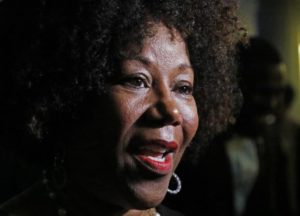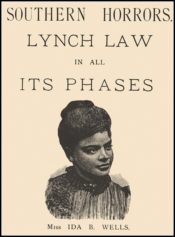
Ruby Bridges Hall, a Tylertown, Miss., native who faced threats and ostracism when she became the first black child to integrate a public school in New Orleans in 1960, speaks with reporters prior to the Friends of Mississippi Civil Rights gala Friday, Feb. 23, 2018 in Jackson, Miss., where she and four other civil rights veterans were honored. (AP Photo/Rogelio V. Solis)
JACKSON, Miss. (AP) — Ruby Bridges Hall, who faced threats and harassment when she integrated a southern school as a child several decades ago, said Friday that she is distressed by mass shootings in U.S. schools.
“When I think about our babies today and them not being safe in school, I think that should be the next civil rights movement, you know, is to ban the assault weapons so that our babies can be safe,” Hall said.
She spoke at a gala in Jackson, Mississippi, where she was one of five activists being honored for advancing civil rights.
Hall, now 63, is a native of Tylertown, Mississippi. When she was 6 and known simply as Ruby Bridges, she became the first African-American child to enroll in an elementary school in New Orleans in 1960, accompanied by U.S. marshals. Some white parents withdrew their children, and she could only eat food brought from home because someone threatened to poison her.
The gala Friday was to celebrate the Mississippi Civil Rights Museum, which has been open about 2 ½ months. Many civil rights veterans boycotted the state-sponsored dedication of the museum in December because Republican Gov. Phil Bryant invited President Donald Trump to attend.
The other honorees Friday were U.S. Rep. John Lewis of Georgia, who was deeply involved in voter registration and other civil rights activities in Mississippi and across the South starting in the early 1960s; Rita Schwerner Bender, who demanded answers from Mississippi officials after her first husband, Michael Schwerner, was one of three civil-rights workers killed by Ku Klux Klansmen in the state in 1964; former state Rep. Robert Clark, who in 1967 became the first African-American of the 20th Century to win a seat in the Mississippi Legislature; and Democratic U.S. Rep. Bennie Thompson of Mississippi.
The first time Lewis traveled to Mississippi in 1961, he was arrested and jailed with other Freedom Riders, black and white, who challenged segregation in a bus station. Lewis, who is African-American, remembers going into a restroom labeled for white men only. A Jackson police officer told him and other young people in the group to leave. They refused.
“The next words he said: ‘You’re under arrest.’ And that was my introduction to the state of Mississippi and the city of Jackson,” Lewis told The Associated Press on Thursday in a phone interview from Atlanta.
After 37 days of being locked up in sweltering local jails and a notorious state prison on the disorderly conduct charge, Lewis was released. He continued working for racial equality in Mississippi and across the South in the 1960s, and as chairman of the Student Nonviolent Coordinating Committee, he helped organize the 1963 March on Washington. Georgia voters elected him as a Democrat to the U.S. House in 1986, and he remains in office.
Lewis’ jail mug shot hangs in a gallery at the museum with those of other Freedom Riders. He was scheduled to speak at the museum’s state-sponsored opening in December but canceled his appearance because of Trump.
Lewis said Thursday that he has never met Trump but, “I felt that I couldn’t be there with him after he said some unbelievable things about individuals and about groups — whether it’s members of the African-American community or the Latino community”
The opening of the Mississippi Civil Rights Museum and the adjoining Museum of Mississippi History capped the state’s bicentennial observation.
The two museums are in downtown Jackson and are separate entities under a single roof. They are a short distance from the bus station where Lewis and the other Freedom Riders were arrested. The general museum skims 15,000 years of history, from the Stone Age to modern times. The civil rights museum concentrates on the intense period of social change from 1945 to 1976.
Lewis grew up south of Montgomery, Alabama, and was 15 years old when a black 14-year-old from Chicago, Emmett Till, was lynched while visiting relatives near the small town of Money, Mississippi. A cousin who was with Till said he had whistled at a white woman in a country store.
“I kept thinking that if something like this could happen to Emmett Till, it could happen to cousins of mine that were living in Buffalo, New York, or were living in Detroit, Michigan, when they came to Alabama to visit during the summer,” Lewis said.
At the gala Friday, a 7-year-old Mississippi girl named Gabriel Owen said she had portrayed Ruby Bridges at school a day earlier and admires her bravery. The second-grader got to meet her new idol and recited a speech she had memorized about the school integration in New Orleans. Hall smiled broadly, opened her arms and said to Gabriel: “Can I get a hug?” Gabriel nodded and stepped into the embrace.
